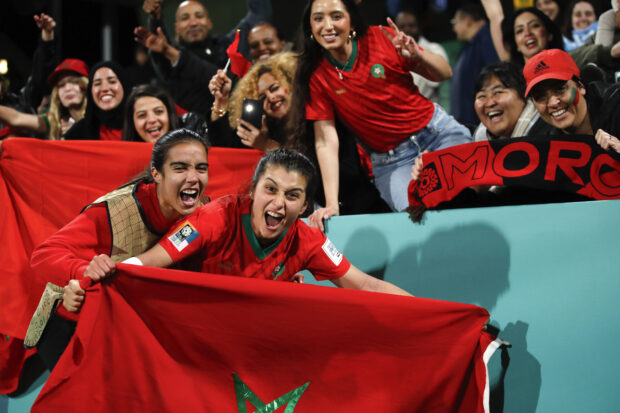
Morocco’s Nesryne El Chad, center, celebrates with fans after the Women’s World Cup Group H match between Morocco and Colombia in Perth, Australia, Thursday, Aug. 3, 2023. (AP Photo/Gary Day)
RABAT, Morocco— In the picturesque town of Sale, the shock and euphoria of Morocco’s football team advancing to the knockout round of the Women’s World Cup were palpable.
“We did not expect this accomplishment,” said Ghita Alaoui, an IT consultant who was at the Hollywood cafe.
Especially after a 6-0 loss to Germany in the opener. But a 1-0 victory over Colombia on Thursday propelled Morocco beyond the group stage — a first for an Arab or North African nation.
The team’s success is being talked about in the bustling cafes and restaurants of Rabat, where news of the victory was spreading. Hicham El Haddaoui, a waiter at Abtal Al Cham restaurant, spoke about his newfound appreciation for women’s football.
“I was not used to watching Moroccan women’s football,” he said.
However, the World Cup games have changed his perspective.
News of the accomplishment went viral on social media, though word spread later in the day because many people were still at work — if not on vacation. So there were no immediate widespread street celebrations or car honking taking place.
Morocco’s Rosella Ayane, center, celebrates with teammates after the Women’s World Cup Group H soccer match between Morocco and Colombia in Perth, Australia, Thursday, Aug. 3, 2023. (AP Photo/Gary Day)
Still, the sentiment is overwhelmingly positive.
“This achievement truly exemplifies the hard work and determination demonstrated by the Moroccan women’s team,” said Ibrahim Barakat, a 25-year-old student in Rabat. “Despite suffering a loss in the opening game, they showed their true character by not only taking part but also qualifying (for the next round).”
While men’s football has long been the dominant sport in Morocco, reactions to the women’s team’s success have shown a remarkable shift. Even as the time difference has affected spectator interaction, the women’s team’s performance has sparked a surge of national pride and interest in women’s football.
This is not to say that the accomplishment has been universally celebrated. In some parts of the Arab world, the historical bias against women’s football remains prevalent, as evidenced by the limited media coverage and attention given to the team’s performance.
Nonetheless, the team’s historic run has created interest and brought visibility to the women’s game in the country. This shift, although not seismic, marks a significant step forward for the sport in a region where it has traditionally been overshadowed by the men’s game.
At the cafe in Sale, a suburb of the Moroccan capital of Rabat, Alaoui said the team’s resiliency has convinced her that they’re capable of “even more impressive feats in the matches to come.”